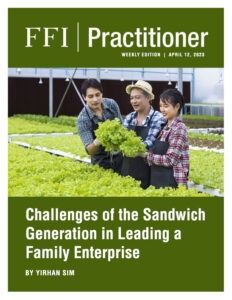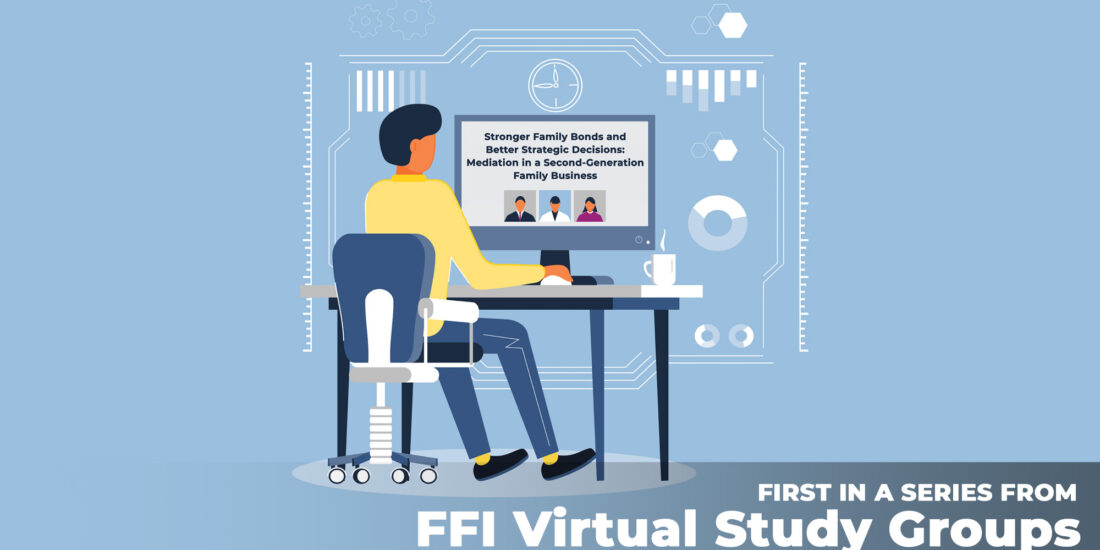
View this edition in our enhanced digital edition format with supporting visual insight and information.
Thanks to the FFI Asian Circle Virtual Study Group and Yirhan Sim for this week’s edition that features a family enterprise case that demonstrates the challenges experienced by the “sandwich generation” through the transition to lead a family enterprise.
Introduction to the Sandwich Generation of the A1 Family Farm
A1 Family Farm is a chicken farming business based in Java, Indonesia. The farm produces eggs in several locations and sells them to customers in different regions across Java. The business is now led and owned by the family’s “sandwich generation,” which includes two sisters, aged 50 and 45, and one brother, aged 48. The business was founded in the early 1970s by their parents, who are now in their late seventies. There are eight third-generation members: the eldest has finished his bachelor’s degree and currently works in the US, three are studying in university, and four are still under 18 years old.
The term “sandwich generation” was first introduced by Dorothy A. Miller, a professor from the University of Kentucky, Lexington, in her article in the journal Social Work in 1981. Her article highlights that “adult children of the elderly, who are ‘sandwiched’ between their aging parents and their own maturing children, are subjected to a great deal of stress” (Miller, 1981, p. 419).
In a family enterprise, multiple generations experience stressors related to family, management, and ownership systems, and these common pressures can be amplified for the sandwich generation. Concurrent family issues can include parents’ illnesses and living arrangements, marriage problems, and children’s reckless behaviors. Concurrent management pressures for the sandwich generation can include managing the “retired” founding generation who still likes to be involved in operations, or managing the senior non-family managers who are reluctant to retire while younger non-family managers are eager to replace them. Different generations might have differing business aspirations, leading to potential conflicts between the legacy business versus new opportunities, and these conflicting priorities further complicate any ownership system the sandwich generation might design for the family enterprise.
I have been advising the A1 Family for more than 10 years, since the start of the leadership transition from the founding generation to the sandwich generation. In this article, I will explore challenges that the sandwich generation’s leaders face in transitioning and leading the family enterprise.
The Dilemma of Letting Go
On paper, the founding generation of the farm business completed the leadership transfer to the sandwich generation five years ago. The transition process had been discussed in family council meetings since the council was formed about 10 years ago.
However, in practice, even though members of the founding generation hold no management positions, they have remained involved in some decision-making. One sandwich generation member shared her dilemma:
Another sandwich generation member mentioned, “Our father enjoyed working so much that he did not have other hobbies outside work, so if he is not allowed to work in the business, he may feel depressed, which would not be good for his health.”
After having discussions with some non-family senior management members, the sandwich generation decided to create a position for the founding generation to stay relevant and involved in the business. Now, the founding generation members make decisions for some areas of customer management, such as determining the pricing process for certain customer segments the founding generation has interest in.
Legacy vs. Future Businesses
The founding generation is dedicated to the farm business they started. They mentioned that the farm is the reason all family members now live comfortably, and they believe that to be a successful family business, all family members have to work together to grow the farm business. Based on this belief, the founding generation was able to influence and guide the current sandwich generation members to choose university majors related to farm management, such as veterinary and animal science, and brought them into the farm business upon graduation. The founding generation similarly expects the third generation members to choose fields of study related to the farm.
The sandwich generation, however, has a different definition of what a successful family business is. They believe the third generation members should be given the opportunity to choose their desired fields of study while being exposed to the farm business at the same time, so they can decide which field they want to pursue in the future. One sandwich generation member mentioned, “I gave up my aspiration to own a fine dining restaurant and helped the farm. The rising generation members should be given the opportunity to start business ventures that resonate with each individual’s aspiration.”
Two rising generation members currently in university have declared social science majors and have not shown interest in the farm business. Instead, they have expressed interest in community services. During one family council meeting, a founding generation member mentioned that involvement in community services may not add value to the farm business. The sandwich generation faces stress as they consider how to convince the founding generation to accept and understand that the family business need not always be about the farm, but can also integrate the interests and aspirations of family members.
After the leadership transition, I helped facilitate the ownership transfer from the founding to the sandwich generation. During this process, the sandwich generation members and I discussed how to grow the legacy farm business while accommodating other business interests from their own generation or the rising third generation.
The legacy farm business has grown so much that it can be broken down into different legal entities that cover various business operations. Beyond the farm’s egg production and selling business, these expanded operations include property, food provision, transportation, engineering, and construction. We worked with legal and tax advisors as well the non-family senior management team to restructure the legacy farm business into a holding company and several subsidiary companies, each of which have a different focus. During this restructuring process, the sandwich generation was able to reduce the founding generation’s pressure on younger generations to work only in the farm business, since the legacy farm business transformed into a family enterprise that created other businesses, enabling a diversification that could provide more opportunities to the rising generation.
Communication Across Three Generations
For the past ten years, the family council has been composed of two founding generation members and three sandwich generation members. The sandwich generation intends to start engaging some rising generation members in family council discussions. However, given the different ways of thinking, interests, and communication styles between the founding and the rising generations, the sandwich generation has felt that having all three generations in the same forum may not be effective at this time.
We agreed to try an incremental meeting process this year. This approach involves having the sandwich generation members hold meetings among themselves to review and align their views on topics in the family constitution. In addition, they will set up a discussion forum with the rising generation members to understand their thoughts on the same topics. They will continue to hold family council meetings with the founding generation. The sandwich generation will facilitate these three different meetings until all three generations begin to participate in family council meetings together.
Thoughts on Sandwich Generation Leaders
The second generation of a family business is unique, in part because it may be the first generation to become a sandwich generation. It is the first generation to experience and thus serve as a model for how to manage three or more generations in an enterprise at the same time. The sandwich generation needs to ensure that the success of the business pioneered by the founding generation can be sustained, expanded, and transitioned smoothly to the rising generation. Meanwhile, they must consider the aspirations of the rising generation alongside the dreams of both the founding generation and their own. This process could include navigating and managing effective communication across three different generations. Additionally, they must provide care and emotional support to the founding generation as they let go of the business.
Advisors working with multigenerational families throughout a long transitional period need to be aware of the family members’ changing leadership roles and that each generation’s leaders may face different challenges and stressors than the previous generation’s leaders. Collaboration with non-family managers, as well as with legal, tax, and other advisors of the family enterprise is essential to making the transition process less stressful for sandwich generation leaders. The collaboration may produce creative communication strategies and innovative business approaches that can cater to the unique needs of the family enterprise and enable the multigenerational family members to work well together.
Reference
Miller, D.A. (1981). ‘The ‘sandwich’ generation: Adult children of the aging.” Social Work, 26(5), September 1981, 419-423.
About the Contributor

Yirhan Sim, FFI Fellow, is a Single-Family Office Director in Indonesia. He was one of the founding executive committee members of the FFI Asian Circle Virtual Study Group. He assists family business owners with family governance, management, and ownership transition. Yirhan can be reached at thesims08@gmail.com.

View this edition in our enhanced digital edition format with supporting visual insight and information.





